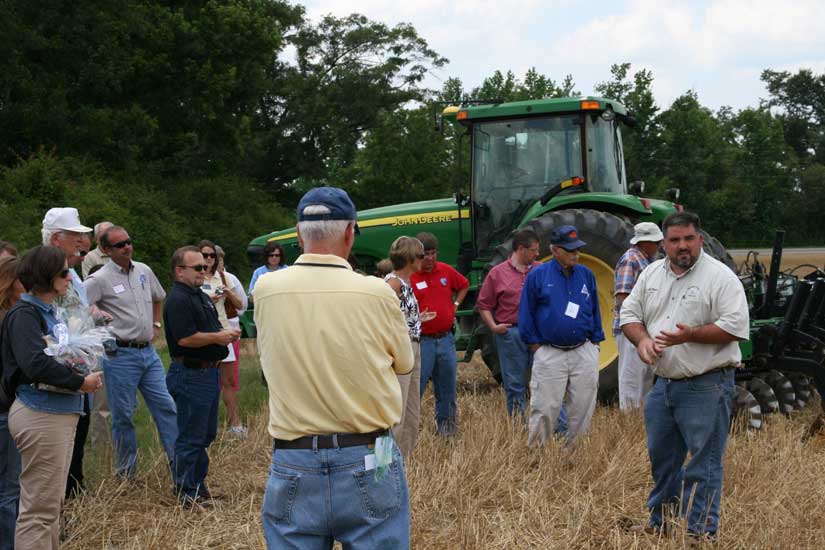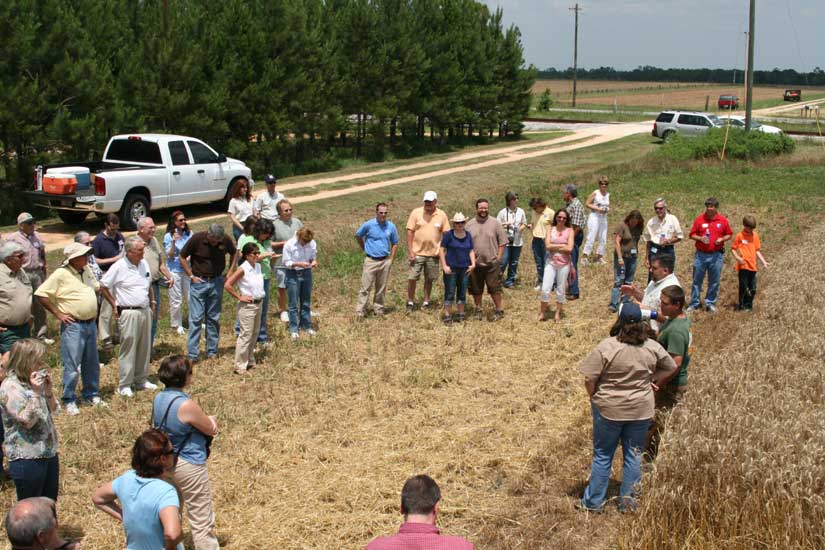Farm Tour Shows Importance Of North Escambia Agriculture
May 29, 2008
The third Escambia County Farm Tour took to the roads of North Escambia Thursday. Over 100 county, city and state leaders joined leaders from the agricultural community on a tour of agricultural locations across the area.
Participants visited the Langley Bell 4-H Center and Emerald Coast Growers in Pensacola; the Touchable Blueberry Farm, the Barrineau Park Community Center and Bayer Cropscience Research Station in Molino; and the Walnut Hill Community Center, Steve’s Sweet Corn, a wheat field and Escambia Grain in Walnut Hill.
“I think everybody has gained a better appreciation for agriculture in this county, from food to clothing,” said Libbie Johnson from the Escambia County Extension Service. “I hope they will go back and share their experiences with others.”
At Escambia Grain in Walnut Hill, farm tour participants learned that the grain elevator company will process 500 to 600 thousand bushels of wheat this year, enough to make about 25 million loaves of bread according to manager Ed Knowlin. That will pump from $3.5 to $5 million into the local economy, he said.
The wheat harvesting in the area will first go to Escambia Grain for processing. It will then be trucked to the Port of Mobile, where most will head to the Caribbean.
“This is a terrific opportunity for the people from the south part of the county to learn what goes on up here,” District 5 Escambia County Commissioner Kevin White said. “They get a chance to see that there is more to Escambia County than just the city.
Commissioners Grover Robinson and Gene Valentino were also along for the ride on the farm tour, along with State Representative Dave Murzin and Pensacola City Councilman P.C. Wu. Numerous candidates for Escambia County offices were also on hand.
At Steve’s Sweet Corn in Walnut Hill, owner Steve Hiebert said the changing economy had forced his farm to evolve over the years. Rather than traditional crops, he will plant 20 acres of sweet corn and 30 acres of other vegetables like peas and butter beans this years, and he has opened the farm’s catfish ponds to public fishing. He said the price of his catfish feed has gone up about 50 percent in just one year.
“The reason we have had to switch from regular row crops to vegetables is the dwindling market,” Hiebert said. “Ninety-five percent of what we sell is retail out of our shop here.”
The tour was organized by the Escambia County Extension Service, USDA Farm Services Agency, Escambia Soil and Water Conservation, USDA Natural Resources Conservation Service, Florida Division of Forestry and the Escambia County Farm Bureau Federation. It was sponsored by Atmore Truckers, Bayer CropScience Research, Chuck Stevens Chevrolet, Escambia Grain Corp., Escambia River Electric Cooperative, Farm Credit of NW Florida, Florida Peanut Producers Association, FNB & Trust, Frank Currie Gin, Helena Chemical Company, International Paper, J.W. Renfroe Pecan Company, Resource Management Services, Smith Tractors, Tri-County Peanut Company, United Bank and West Florida Gin.
For a photo gallery from the 2008 Farm Tour, click here.
Pictured above: Farm Tour participants learn about no-till planting at a field behind the Walnut Hill Community Center. Pictured below: The farm tour stops at a wheat field being harvested along South Highway 99. NorthEscambia.com photos, click to enlarge.





Comments